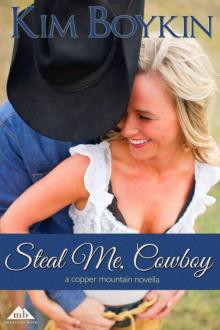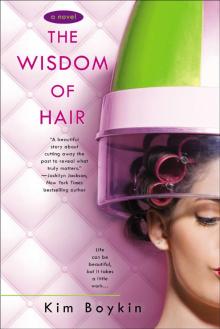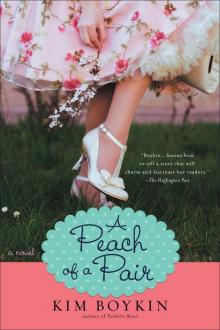- Home
- Kim Boykin
The Wisdom of Hair Page 8
The Wisdom of Hair Read online
Page 8
I could tell by the sound of Mrs. Cathcart’s voice that she would be crushed if I said no, but I had serious reservations about working on any dead person, much less fiery old Ethyl.
“Sheriff, I’m ready for you,” Sissy Carson called.
“Sissy’s going to cut my hair,” he said. “I’d appreciate if you would just call the funeral home and let them know what you decide.”
“Now, Zora, you can do this. I know you can.” Mrs. Cathcart started in on me, and she didn’t stop until I agreed to go on down to the Garden Rest Funeral Parlor and fix that woman’s hair. “I have a little something for you. It’ll help you get through this,” she said as she led me back to her office.
She took a prescription bottle out of her purse, took four little blue tablets out, and put them in a church-offering envelope she had sitting on her desk.
“What is it?” I asked.
“Just take one of these now, and another one if you have trouble sleeping tonight. It’s just a little Valium, dear. Dr. Hobart gave them to me for times such as this.”
I nodded and wondered what the other two tablets were for. She handed me a little pointed paper cup she’d filled from the watercooler and watched me take the pill like I was a child. Then she said she’d have Mr. Cathcart drive me over to the funeral home.
“That’s okay, Mrs. Cathcart. Sara Jane’s home sick today.” It was a lie. She’d called me from a hotel at the beach that morning to tell me all about her romantic date while Jimmy was in the shower.
“Won’t she be in bed?”
“She’ll be glad to give me a ride.”
“Well, okay.” Mrs. Cathcart sounded unsure about sending me off with Sara Jane. “Don’t you be driving now,” she called out as I walked to the reception desk to use the phone.
“Promise you won’t laugh, Sara Jane?”
“I’m already laughing.”
“Remember Ethyl?”
“The old bat at the nursing home?”
“She passed last night and now I’m supposed to do her hair.” I had to hold the phone away from my ear she was snorting so loud. “I need a ride, Sara Jane.”
“Yeah, but not to a funeral home. Zora, you don’t have to do this.”
“Mrs. Cathcart talked me into it. I don’t have a choice.”
“Sure you do, just tell her you changed your mind. Just tell her no.”
She was right. I could have marched myself right over to Mrs. Cathcart and told her, living or dead, there was no way I was going to work on Ethyl again. But the truth was, I loved Mrs. Cathcart, and I didn’t want to let her down.
“Just come get me. Okay?”
Sara Jane was there in ten minutes with the latest issue of Bride magazine and a bunch of other magazines with pictures of happy brides on the cover.
“Is there something you want to tell me?” I asked, leafing through one of the magazines.
“Just looking.” Her grin was so big, it was a wonder she could talk. “Are you okay with this?”
“Your sure thing or fixing Ethyl’s hair for her date with Satan?”
“Both.”
“Sara Jane, I promise you, nobody will be happier for you and Jimmy when he pops the question than me. I just can’t believe I’m doing this, but Mrs. Cathcart gave me something to help me get through it.”
“A blindfold?” Sara Jane suggested.
I pushed the double doors to the funeral home open and stepped inside. The large foyer was outlined with heavy wooden settees and polished tables, and the old wooden floor creaked just enough to make being there to fix a dead woman’s hair even creepier. The dusty scent from the fancy hallway rug or maybe the gaudy brocade fabric on all those couches made my nose sting.
“You must be Miss Adams,” the man said in a reverent whisper of a voice. “I’m Bob Platt. The school called and said that you were on your way. Have you ever done this before?” He guided me down a hallway toward the back of the old house.
“No, sir.”
“Well, it’s not as bad as most people think,” he said. “Did you know Miss Ethyl very well?”
“No. I did her hair a couple of times at the nursing home.”
“They say she was a terror, this one,” he said as he pulled the sheet back.
Now I thought when I saw the corpse I would be repulsed, but I was not. She looked so peaceful, I wanted to touch her to see if she was real.
“Go ahead,” he said. “Everybody wants to touch them to see what it’s like.”
I did. She was cold and hard and her hair was a mess. I don’t know if it was the Valium kicking in or the natural annoyance every hairstylist has when they see someone’s hair all messed up, but I set my bag down on the little table by the gurney and went to work on Ethyl like it was something I did every day.
She was laid out on a cold metal table with nothing more on than a sheet. Whoever had done her makeup had gone heavy on the blush, but the color of base they used still made her look dead.
“May I?” I nodded toward the tray with every sort of makeup you could imagine.
“My brother’s out of town; he’s the artist in the family. Me? I’m good at the nuts and bolts of this job, really good with the families, but I’ve never been good at the cosmetic stuff.”
I took a sponge and dabbed some Fawn Beige foundation on Ethyl to make her at least look a little warmer, and blotted over the cheek color until it looked more natural. When I stippled the black circles under her eyes, her skin didn’t have any give to it, but the folds of skin in her neck were taut again, which living or dead is always a plus.
“Does she look—” I began.
“Okay? She looks great.”
“Does she look too—alive?”
“Well, maybe a little.” He took the sponge he’d used to apply Ethyl’s makeup and dabbed below her cheeks so that they looked hollow and gray. “There.”
I shrugged and ran my fingers through her hair. It felt the same as I remembered and looked like she’d had a cut and set recently. The curling iron was already hot and I used it to make short, neat rolls. There wasn’t much in the way of brushes or combs and the like, so I took a long blue teasing comb out of my purse that had a metal pick on the end of it. I teased the top of her hair just a little, smoothed it over, and picked at the curls until they fell into place.
“You’re good,” Mr. Platt said. “This old place has lost its shine for my brother; he’s not around as much as he ought to be. You know, if you want some side work, I can give you all you want.”
“Oh, I can’t,” I said, still fussing with Ethyl’s bangs.
“You don’t need a cosmetologist’s license to work on the deceased. Anybody can do it.”
Even with Sara Jane insisting on paying when we went out and my eating whatever I made Winston every night, I already had gone through half of my kitty. I was broke, but I wasn’t desperate.
“No thanks. I just did this for Mrs. Cathcart.”
“Well, you’re good, real good.”
He opened his wallet and gave me a fifty-dollar bill. “There’s good money in this business; somebody’s always dying.”
I told him I was still feeling light-headed, which was true. I’d been there about thirty minutes and had already made ten times more than I’d made in tips the whole time I’d been at beauty school.
“Thank you. I could really use the money.” I called Sara Jane. Mr. Platt took a break and sat with me in the foyer with me while I waited for her.
“I wasn’t a hundred percent honest. It’s just me now. My brother went on a vacation to the Keys last year, says he’s not coming back. Can’t say that I blame him. He’s working for a charter company taking tourists out on some big boat every day.”
“Is that what you want to do? Something besides this?”
“Sometimes, but no. I like the peace and quiet most of the time and helping people deal with their grief. I can’t imagine doing anything else, but this can be a lonely business.” He was a homely man and sing
le, according to his left hand. He would have looked a lot better with a good haircut. “Since my brother’s been gone, I’ve gotten folks to fill in here and there for hair and makeup. I’ve even done a few heads myself. They looked all right, I guess. Nobody complained.”
Things were quiet for a while, and then he apologized for rambling on. I saw Sara Jane pull up to the curb, and I’d started out the door when I turned around to ask him something.
“Change your mind about the work?”
“No, but thanks for asking me. I was just wondering, did you do an Emma Sawyer two, maybe three years ago?”
“Emma Sawyer,” he repeated. “Oh, yeah, I remember her. Pretty woman, well, the picture I saw of her was pretty. She was all tore up when they brought her in here. It was sad. Her mama didn’t want her cremated, but her husband, some hippie type at the college here, had it done anyway. Was she a friend of yours?”
“Oh, no. I just—” Sara Jane blew the horn. “I’ve got to go now. Bye.”
I told Sara Jane every little detail about working on Ethyl. She commented how nice it must have been to work on the old woman with her mouth shut. I told her about Bob Platt, that he’d paid me fifty bucks and offered me a job there, which really made her cackle. But I never told her what he said about Emma.
12
Mrs. Cathcart moved her mother in with her and Mr. Cathcart about midway though the semester and gave Mother Hannah the title of official greeter for the Davenport School of Beauty. Mother Hannah doled out customers to the students in her own way, using a complicated system based on how much she liked you or how nice you were to her. Her memory wasn’t what it used to be, so she carried around a little notepad that she kept in the pocket of the powder-blue smock she wore that brought out the color of her eyes. Every time somebody slighted her or she felt like they didn’t show her the proper respect, she’d make a little notation in the book like “Tuesday, August 8, 1983, Gina Franklin smarted off to me for no reason. Stay mad at her for one week.”
Sometimes I’d glance up from my patron’s hair to find Mother Hannah gazing around the room with an addled look on her face, like she was trying to remember who was supposed to get the next walk-in. I don’t know why she didn’t write things like that down, but she didn’t. Just before the customer got fed up and walked out, she would do “Eenie Meenie Miney Mo” to herself with those long, gnarled fingers and then gave the walk-in to the—very—best—one, and if she was mad at y-o-u, you—were—not—it.
I know about the notebook because Deana Malloy, the girl in the station next to mine, found it on the floor beside one of the hair dryers one day after Mother Hannah had gone home. Deana had a big time reading it out loud until Mrs. Cathcart caught her and gave her a stern talking to about respecting her elders. I don’t think Mrs. Cathcart ever told Mother Hannah about the whole incident because if she had, Deana Malloy would never have had a single customer.
Mother Hannah had been a Ziegfeld Girl. I didn’t know what that was until she told me her stories about working in vaudeville as a dancer. She loved to talk about her life on the road, but every time she did, Mrs. Cathcart would get real irritated and change the subject. Mother Hannah pretended like the vein in her daughter’s forehead wasn’t throbbing like there was a swarm of bees underneath her skin and went on about the fancy parties, all the handsome men, and Mr. Ziegfeld himself.
One day Mrs. Cathcart asked me not to talk to her mama anymore about her Ziegfeld days.
I told her I was sorry, that I was just trying to be nice and listen to an old lady who had so many stories to tell. I could see how those stories pained Mrs. Cathcart, so I tried to avoid the subject altogether, but it wasn’t easy. I think Mother Hannah kept cornering me because I was the only person who would listen to her.
One day, Mrs. Cathcart was really edgy; she said she was that way a lot because she was going through the change. I think it was because her mama was wearing a brooch she said “Ziggy” had given her.
“Mama, now, I’ve asked you a hundred times, please, talk about something else.”
Mrs. Cathcart’s face was bright red from a hot flash. Little beads of sweat ran down her forehead. She dabbed at her face with a lace handkerchief she kept in her pocket, trying to compose herself.
I was minding my own business putting towels in my station because things were kind of slow. I guess there were probably three or four customers in the whole school at the time Mother Hannah strolled over to my station.
“It’s a nice day out, isn’t it, Mother Hannah?” I said, trying to look busy. “I’d like to be outside, wouldn’t you?”
“Zora, did I ever tell you about the time me and Ziggy—”
“Mama,” Mrs. Cathcart snapped from halfway across the room before she stormed over to us. “I’ve asked told you to put that foolishness behind you. That was a long, long time ago, Mama. Let it lay.”
I looked at Mother Hannah and expected to see her sad and hurt, but if Mrs. Cathcart was having a snappy spell, Mother Hannah was having a defiant one.
“She can’t take the truth,” she said as she sat down in my chair and checked her look in the mirror like she was still pretty and young. “Absolutely hates it when I talk about her father.”
That did it. Mrs. Cathcart jerked the chair around hard so that the old woman faced the mirror. She put her hands on Mother Hannah’s shoulders, and lit into her.
“Look at yourself, Mama. You’re just an old woman who was a substitute in a chorus line for two nights, Mama. All these years you’ve romanticized those two lousy nights into a whole career. My God, you never even met Florenz Ziegfeld. You only saw him once, across a crowded theater, so there’s no way he’s my daddy. Buddy Hannah was my daddy, Mama. He was a sweet, decent man who died when I was eleven. You’re the one who can’t take the truth, Mama. You ran away from home when you were seventeen, and when your daddy found out where you were, he went to New York, tanned your hide, and drug you back to Davenport where you raised six kids on a hog farm. And if I hear you so much as breathe the word Ziggy one more time, I swear I’ll…I’ll…Oh, for God’s sake, Mama, just let it go.”
Every bit of truth that spewed out of Mrs. Cathcart’s mouth was like venom. One minute Mother Hannah was a feisty, vivacious Ziegfeld Girl and the next she was a nobody. The old woman stroked the brooch that I later found out she had bought at J.C. Penney and looked at me. She was pitiful.
“Those were the best two nights of my life,” she whispered through the tears.
Mother Hannah got up, walked out the front door of the Davenport School of Beauty, and never came back to the school. She died two weeks after that. Mrs. Cathcart grieved so. I know she thought she killed her own mother. I don’t know, maybe she did. I guess Mrs. Cathcart just couldn’t stand those silly stories another minute any more than her mother could force herself to live and die in the real world.
I felt so bad for Mrs. Cathcart, because I felt the same way about Mama. I knew Mrs. Cathcart’s trick of looking anywhere but at the embarrassment in front of her, hoping it would pass. I used to pretend Mama was normal and not a poor replica of Judy Garland. I acted like I didn’t want to crawl under the ground and die when she went on and on about how men were drawn to her like yellow jackets drawn to sweet tea. I remembered being red-faced when she showed up drunk in front of the few friends I had, and then I shut those good people out of my life because I was embarrassed. Ever since I could remember, I wanted to snatch my own mother into the real world, but I don’t think she could have existed there any more than Mother Hannah.
After the funeral, Mr. Cathcart put that J.C. Penney brooch on my station when he thought no one was looking. I held it in my hand for a moment, thinking about Mother Hannah and all those wild stories she told me before I slipped her dream into my pocket.
“Florenz Ziegfeld.” I said it out loud. I said it for her.
*
Mrs. Cathcart was out a good while after the funeral. Her sister-in-law Doris, who was a license
d cosmetologist, taught our class. Mr. Cathcart handed out the appointments until he found that Swenson girl to do it. Both of them did it fairly, so no one complained.
Sara Jane Farquhar never had to worry about anybody doling out customers to her. She could have been busy from the time the doors opened until they closed if she’d wanted, but she was in love with Jimmy Alvarez, and that took precedence over everything, including school. She had herself a D+ average before Jimmy came into her life, but it just went to hell after that. Still, she had more clients than she could do. More than half of the customers who walked through the doors requested her. What she did for them, she did out of pure natural ability, D+ average or not.
I’m telling you, she could transform the mousiest or the trashiest-looking customer into someone as elegant-looking as her real-life heroine, Jacqueline Kennedy Onassis. Most all of them looked the part, until they opened their mouth to pledge their undying love to Sara Jane, the miracle worker. The rest of us were glad she was there because even Sara Jane could only do so much.
Nearly all the walk-ins who asked for her ended up with one of us. Some of them were happy with their hair, and some of them marched themselves over to that appointment desk to make an appointment with Sara Jane right in front of the poor girl who hadn’t done their hair just right. I speak from experience when I say that was just about the most embarrassing thing that could happen.
But Sara Jane was in love, and no matter what anybody said or thought about it, the fact was there was no undoing what she felt. And Jimmy was the hardest worker you ever saw, working seven days a week—that is, before he met Sara Jane. But he was in love, too, so Friday and Saturday nights were their nights, and Monday and Tuesday afternoons and every single rainy day were their days. Sometimes I sat in the sun while the two of them carried on up in my apartment. Sara Jane looked so happy when they floated down those stairs, and I loved the way Jimmy wrapped his arms around her as best he could and gave her one last kiss before he had to leave.

 Just In Time for Christmas
Just In Time for Christmas Flirting with Forever (Island Bliss)
Flirting with Forever (Island Bliss) Steal Me, Cowboy (Copper Mountain Rodeo)
Steal Me, Cowboy (Copper Mountain Rodeo) Caught Up in You
Caught Up in You The Wisdom of Hair
The Wisdom of Hair Zen for Christians: a beginner's guide
Zen for Christians: a beginner's guide A Peach of a Pair
A Peach of a Pair